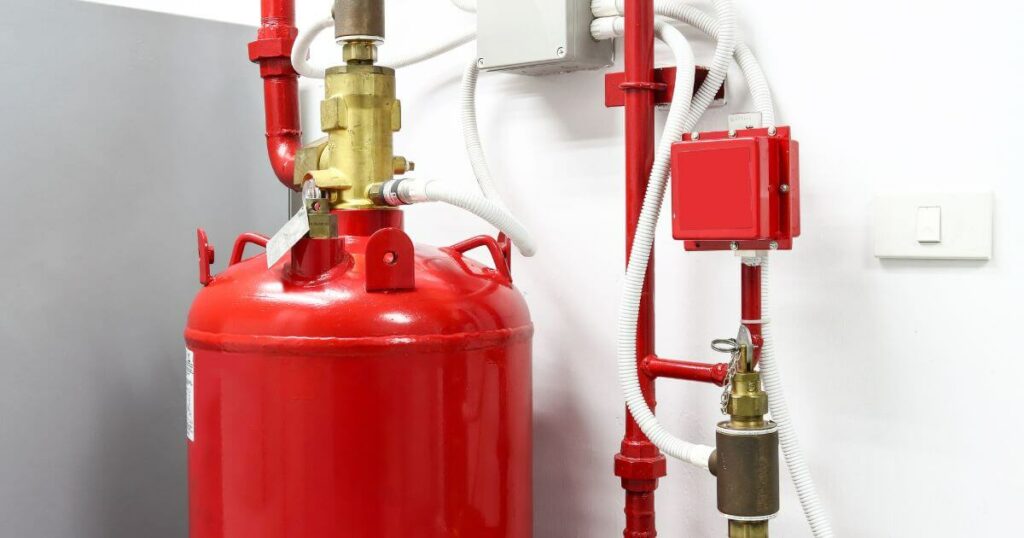Experiencing a house fire confronts you with both a financial punch and an emotional toll. The flames might leave a hole as big as $25,000 in your pocket, depending on the extent of damage, size of your property and what was in it. It’s like being sucker-punched, having to grapple abruptly with loss, trauma, displacement; even the echoes of crackling flames might keep haunting you. However, the flames aren’t the end – comprehensive homeowner’s insurance covering fire damage and preventive measures like a fire suppression system can lessen this blow. Installing a system from All American Fire Protection, specialists in fire suppression systems, can be a crucial step in safeguarding your home against future fires.
A house fire can have devastating financial and emotional effects. From property damage and loss to the trauma experienced by individuals and families, recovering from a house fire requires significant resources and support. It’s crucial to have comprehensive insurance coverage and access to counseling services to mitigate these impacts.
The Financial Blow: Estimating House Fire Damage Cost
When a fire strikes, the financial repercussions can be significant. To put things into perspective, the National Fire Protection Association estimates that the average cost of property damage in a house fire is around $25,000. However, it’s important to keep in mind that this figure can vary widely based on several factors such as the extent of the damage, the size of the property, and the items affected.
The aftermath of a house fire can present a complex mix of financial challenges. It’s not just about the structural repairs; it also involves replacing personal belongings and addressing any interim living costs while the property undergoes restoration. These expenses can add up quickly and become overwhelming for homeowners.
Having a comprehensive homeowner’s insurance policy becomes incredibly important in light of these potential costs. Homeowners should carefully review their insurance coverage to ensure that they are adequately protected in case of fire damage.
For instance, some policies might cover only the structure itself and not personal belongings, leading to additional out-of-pocket expenses. It’s crucial for homeowners to be fully aware of what their insurance policy covers in order to avoid unexpected financial strain after a fire.
Moreover, installing a fire suppression system as a preventive measure could make a substantial difference in mitigating potential financial losses and protecting both property and lives. This is where our company’s expertise comes into play. We specialize in providing comprehensive fire protection solutions that include top-of-the-line fire suppression systems.
It is imperative for homeowners to not only have adequate insurance but also take proactive steps by investing in preventive measures such as fire suppression systems to minimize potential fire damage.
Understanding the potential financial burden of a house fire underscores the importance of being prepared with robust insurance coverage and taking preventive measures to safeguard against such catastrophic events.
The aftermath of a house fire extends far beyond the physical damage and financial implications, delving deeply into issues of emotional distress, upheaval, and coping strategies. Let’s now explore how individuals navigate these complexities of loss and displacement after experiencing a house fire.
Emotional Toll: Dealing with Loss and Displacement
When a house fire strikes, it’s not just about the physical destruction; it’s the emotional toll that often hits the hardest. Being suddenly displaced from your home, losing cherished possessions, and feeling unsafe can contribute to deep emotional wounds that take time to heal. It’s not uncommon for people to experience a range of emotions such as grief, anxiety, anger, and depression in the aftermath of a house fire.
The sentimental value of items lost in a fire can be immeasurable. Irreplaceable photographs, family heirlooms, and mementos all symbolize precious memories. The sheer weight of realizing that these are gone can be tremendous. This sense of loss is real and valid, and it’s important to allow space for grief.
But How Should You Cope? Firstly, acknowledge your feelings. When you bottle them up, they tend to linger longer and influence your mental health negatively. Talking about what happened and how you feel with friends or family members or seek professional support can help relieve some of the emotional burden.
It’s like taking off some heavy luggage you’ve been carrying around; sharing your feelings lightens the load.
Building back your emotional well-being is just as vital as rebuilding your home after a fire. Adapting to temporary living arrangements while watching familiar spaces being restored can stir up a whirlwind of emotions. Take it one step at a time and acknowledge that healing emotionally is an ongoing process. There will be good days and bad days.
Prioritize Self-Care In times like these, prioritizing self-care becomes crucial. Establishing daily routines, getting enough rest, eating healthily, and engaging in activities that bring peace to your mind are essential steps in managing stress.
Seeking Support
Seeking support from others should never be underestimated. Friends, family members, neighbors, or support groups can provide comfort and practical assistance that eases the burden of recovery.
It’s important to seek emotional support from friends, family, or mental health professionals and to prioritize self-care during the recovery process.
Allow yourself time to grieve but also remember that reaching out for help is a sign of strength. In the wake of such a challenging experience, simply taking care of yourself each day is an act of courage.
As you navigate through these trying times, understanding the financial implications of a house fire becomes imperative. Let’s look at feasible ways to manage these challenges by addressing financial strain through insurance and claims.
Addressing Financial Strain: Insurance and Claims
Dealing with the aftermath of a house fire can be emotionally draining, and when combined with financial uncertainty, it can be overwhelming. A vital step after a fire is contacting your insurance company to initiate the claims process. It’s important to document the damage thoroughly—take photos and videos if possible and keep records of all communications with your insurance provider.
When understanding what’s covered – and equally important, what’s not – in your insurance policy, it can greatly influence your next steps. Some policies may not cover certain types of damage or have specific limits on coverage for certain items, so being aware of these details will help you manage your expectations and plan ahead. Having a detailed inventory of your possessions can serve as concrete proof for your claim, potentially streamlining the process.
Once a claim has been filed, following up with the insurance company is crucial to ensure that the claim is being processed. Prompt and persistent communication throughout this process can expedite the resolution and save you from undue stress.
For instance, say you have valuable artwork or jewelry that was damaged in the fire. Having records showing their value and ownership will strengthen your claim for reimbursement. On our website, we provide valuable information and resources regarding the importance of a comprehensive insurance policy, including tips on navigating the claims process effectively.
If you’ve been affected by a house fire, taking these steps might seem demanding while coping with the emotional impact. However, this diligence will better position you to recover financially and rebuild your life with greater ease.
In summary, understanding the nuances of insurance claims post-fire is an essential part of addressing the overall impact—both emotionally and financially—of such traumatic events.
Road to Recovery: Rebuilding After the Blaze
Starting over after a devastating house fire can feel overwhelming. Each step can seem like a mountain to climb. But remember – every small step you take is one step closer to having your home back. And having it back isn’t just about a building—it’s about finding your security and peace again. So, let’s walk through some key steps that will assist you in reconstructing your life after facing such a traumatic event.
Coordinating Reconstruction Efforts
In the wake of a fire, perhaps the most challenging task is orchestrating the reconstruction process. It typically begins with seeking out contractors, architects, and discussing plans with local authorities. This phase involves careful planning and strategic coordination with various professionals aimed at resurrecting your beloved space as it once was.
Prioritizing Safety and Compliance
Faced with the devastation, it’s crucial to prioritize safety during the reconstruction process. Every element will need thorough consideration—airtight coordination with contractors and other consultants will guarantee that your new space is compliant with building codes and safety standards.
Setting Up a Temporary Residence
Once the wheels of reconstruction have been set in motion, many families find themselves needing to set up temporary residence. This sounds simple enough until you realize what all will be needed—identifying suitable accommodations, looking after family members’ varying needs, even if they’re non-human.
Utilizing Fire Suppression Systems for Future Protection
Consider exploring fire suppression systems that can potentially minimize property damage and safeguard against potential future fiery encounters. They offer solutions that can be instrumental in reducing damage in case of another unfortunate incident. Exploring these options might provide some peace of mind and offer insights into how to avoid extensive recovery processes.
Rebuilding is never an easy feat; each battle comes with its hardships. But remember, you’re stronger than you realize; traversing this seemingly enormous obstacle is within your grasp—taking things step by step will eventually lead you to reclaim what was once yours.
As we find ourselves navigating through these trials of resilience and fortitude, turning towards avenues of emotional support can bring solace amidst the turmoil. Let’s now turn our attention to learning about the vital assistance that support resources can provide during times of emotional duress.

Seeking Emotional Respite: Support Resources
Experiencing a house fire can be incredibly traumatic, and it’s important to remember that you don’t have to navigate this challenging time alone. Countless support resources are available to aid individuals and families affected by house fires, including community support groups, professional counseling services, and financial assistance programs.
Community Support Groups
Oftentimes, local communities have established groups specifically for individuals who have experienced house fires. These groups provide a safe space for sharing experiences, offering comfort, and receiving guidance from others who have also endured similar hardships. Joining one of these groups can help you connect with people who understand what you’re going through and offer valuable emotional support.
Professional Counseling Services
Seeking the help of professional counselors or therapists can provide an outlet to process your feelings and cope with the emotional aftermath of a house fire. These professionals can guide you through the process of managing anxiety, depression, grief, and trauma related to the event. They offer a safe environment to express your emotions and develop healthy coping mechanisms.
Financial Assistance Programs
Dealing with the financial aftermath of a house fire can be overwhelming. Fortunately, various financial assistance programs are designed to aid individuals and families in need. These programs may provide monetary support for essential needs, temporary housing, or home restoration. Exploring these options can alleviate some of the financial burden following a fire-related incident.
For instance, our website offers comprehensive guidance on fire prevention strategies, including the installation of fire suppression systems. By implementing these proactive measures, individuals can reduce the likelihood of future emotional distress due to fire-related incidents. This proactive approach not only contributes to physical safety but also helps mitigate the potential emotional toll caused by recurring trauma.
Accessing these support resources is an integral part of the recovery process after a house fire. They provide essential emotional respite and practical assistance, guiding individuals and families towards healing and rebuilding their lives.
Nurturing emotional recovery is just one piece of the puzzle in restoring normalcy after a horrific incident like a house fire. Let’s now explore pragmatic steps toward preventing such tragedies from reoccurring in “Avoiding History Repeat: Implementing Fire Prevention Measures.

Avoiding History Repeat: Implementing Fire Prevention Measures
Among the numerous steps to take post-fire, one of the most important is implementing fire prevention measures, which can immensely reduce the risk of future house fires. The aftermath of a house fire isn’t just about recovery; it’s also about actively working to prevent such devastating events from occurring again. Installing smoke detectors and fire extinguishers, ensuring they are regularly maintained, and adding a fire suppression system ranks among the most effective ways to enhance safety within any home.
Smoke detectors act as an invaluable early warning system, alerting occupants to danger while there’s still time to evacuate. Equally important are fire extinguishers, capable of combating small fires before they escalate. However, the installation and vigilant maintenance of a fire suppression system provide an added layer of safeguarding against rapid fire growth, significantly minimizing potential damage.
Just imagine it this way: A reliable smoke detector is like having a keen-eyed guardian always watching over your home. Meanwhile, a well-maintained fire extinguisher serves as an immediate defense against unforeseen flames.
Moreover, these fire safety components play pivotal roles in easing emotional distress too. By taking tangible steps to bolster the safety of your home, these measures offer peace of mind and a sense of control that can meaningfully alleviate fear and anxiety.
Our website provides information on the importance of fire prevention and suppression systems in mitigating fire damage and emotional distress.
The implementation and regular maintenance of these preventative tools are more than just acts of prudence; they’re investments in security and wellbeing. In conjunction with the physical preparations, education about the proper use of these tools should be made available. After all, what good is a tool if you don’t know how to use it?
In essence, preventing another house fire doesn’t just serve to shield property; it aims at preserving peace of mind and ensuring a safe environment for everyone within the home.
It’s clear that proactive measures like smoke detectors, fire extinguishers, and fire suppression systems play substantial roles in averting potential disasters and provide critical first lines of defense against unforeseen fires.
Replacing Lost Treasures: Coping with the Irreplaceable
When a fire ravages a home, it not only consumes our cherished belongings but also engulfs our memories and emotional history. Photos capturing birthdays, wedding moments, or kids’ first steps can’t be repurchased or restored.
The magnitude of coping with such losses is immeasurable. There is no quick fix to heal the ache of realizing cherished possessions have been reduced to ash. The process of recovery involves honoring what was lost and finding new ways to preserve the memories carried by those items.
For instance, consider how an old family photograph carries with it not just an image but the sensations, personalities, and emotions of that time period. Crafting stories around these lost belongings can be a way to keep their memory alive. Gathering as a family to reminisce about special occasions and using photos as prompts for storytelling can help everyone process their grief and hold onto those precious memories.
Photograph Preservation Tips
| Tips | Details |
| Make copies | Digitizing your most treasured photographs preserves them even if the originals are damaged. |
| Fire-resistant storage | Investing in a fire-resistant safe provides added protection for physical copies of precious photos and documents. |
In addition to photos, there might be objects like heirlooms or handmade gifts that carry significant sentimental value. While recovering the physical items may be impossible, finding ways to honor them is within reach. Turning to cherished traditions can also help in dealing with the loss. For example, planting a tree or garden in memory of what was lost could become a new tradition symbolizing renewal and growth from tragedy.
Investing in fire-resistant safes not only secures important documents but also offers a layer of protection to those few physical irreplaceable mementos that survived. Advanced models are designed to withstand prolonged exposure to high temperatures during a house fire.
Digitizing your photographs and other records is another way you can prepare for disasters proactively. It ensures you will still have access to these valuable items even if the worst should happen.
Ultimately, while nothing can fully replace the items lost in a house fire, the memories associated with them can be preserved through thoughtful storytelling and careful consideration about how best to protect them moving forward.
It’s essential to take proactive steps to secure precious memories during times of crisis. Learn how you can protect your home from unforeseen fires with All American Fire Protection. Call All American Fire Protection at (910) 496-0600.






